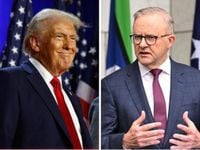Cars in Australia are set to become significantly cheaper as Prime Minister Anthony Albanese's government considers scrapping the controversial Luxury Car Tax (LCT) in a bid to strengthen trade ties with the European Union (EU). This potential move comes as part of a broader strategy to enhance Australian agricultural exports to Europe, amid growing competition from affordable Chinese-made vehicles.
The LCT, which has been a contentious issue since its introduction in 2001, was originally designed to protect the local vehicle manufacturing industry. However, with the closure of major manufacturers like Ford, Holden, and Toyota in 2016 and 2017, the relevance of this tax has come under scrutiny. Currently, the LCT applies to vehicles priced over $80,567 (or $91,387 for low-emission cars), adding a tax of 33 cents for every dollar above these thresholds, generating approximately $1.2 billion in annual revenue for the government.
According to reports from The Australian, a source close to Prime Minister Albanese indicated that the government is prepared to eliminate the LCT in exchange for improved access for Australian agricultural exports to Europe’s 450 million consumers. This arrangement aims to provide a more competitive landscape for Australian goods while addressing the concerns of European automakers who have long argued that the tax hampers their ability to compete in the Australian market.
"A source close to the Prime Minister said the government was prepared to dump the tax in return for better access for Australia’s agricultural exports to [Europe’s] 450 million consumers," The Australian reported. EU officials have been advocating for the abolition of the LCT for at least five years, seeing it as a barrier to trade.
Despite the ongoing discussions, the Albanese government has clarified that the LCT will remain in place until a satisfactory agricultural deal is finalized. This cautious approach stems from the difficulties faced during previous negotiations, which collapsed in 2023 over similar issues.
As the automotive landscape evolves, the LCT's relevance has diminished significantly. European car manufacturers are increasingly struggling against a surge of affordable electric vehicles (EVs) from China, which have flooded the market. The pressure on European brands like Volkswagen and BMW has intensified, leading to factory closures and reduced sales in Australia. In fact, reports indicate that VW sells half as many cars in Australia today compared to a decade ago, and Fiat's sales have plummeted to just one-tenth of what they were in 2015.
"The rise of Chinese car brands is an emergency for car makers such as VW," one industry analyst noted, highlighting the urgency for European manufacturers to adapt to the changing market dynamics.
In addition to the LCT, vehicles from Europe are also subject to a five percent import tariff due to the lack of a free trade agreement between Australia and the EU. This combination of taxes has made it increasingly difficult for European brands to maintain a competitive edge in the Australian market.
Critics of the LCT argue that it has become outdated and punitive, disproportionately affecting buyers of higher-end vehicles, including popular models like the Toyota Prado and Nissan Patrol, which have also crossed the LCT threshold as prices have risen over the years. Nationals Senator Matt Canavan expressed concerns about the government's potential decision to scrap the tax, stating, "I think it’s a bit strange for the first act of a government to be giving a massive free kick to people who can afford very expensive European cars." He questioned the logic of making luxury vehicles cheaper while potentially imposing penalties on more affordable, higher-emitting vehicles as part of the New Vehicle Efficiency Standard (NVES).
The NVES, introduced earlier this year but not enforced until July 1, 2025, sets targets on carbon dioxide emissions for each vehicle sold. Manufacturers will face penalties if they exceed these limits, which could lead to increased prices for consumers. However, the abolition of the LCT could help offset these potential price hikes.
Meanwhile, the Australian Automotive Dealer Association (AADA) has been a vocal advocate for the scrapping of the LCT, calling it a "relic of an era when Australia manufactured vehicles." In its pre-budget submission, the AADA argued for the complete abolition of the tax, emphasizing that it disincentivizes customers from purchasing newer, safer, and more environmentally friendly vehicles. They also highlighted that the tax unfairly penalizes buyers, particularly in regional areas, who require larger vehicles for safety and utility.
"If the total abolition of the LCT cannot be achieved in a timely manner," the AADA stated, "then we propose reforms to the LCT, such as raising the threshold to target truly luxury vehicles and staging a sunset period for LCT, exempting low-emission vehicles, and excluding accessories from the calculation of whether a vehicle hits the threshold for paying the LCT."
As discussions continue, the future of the LCT remains uncertain. The Albanese government is faced with a delicate balancing act: satisfying the demands of European negotiators while also addressing domestic concerns about vehicle affordability and environmental standards. If the tax is ultimately scrapped, it could pave the way for more competitive pricing on luxury vehicles and potentially stimulate the automotive market in Australia.
In summary, the potential removal of the Luxury Car Tax signifies a pivotal moment for both the Australian automotive industry and its agricultural exports. As the government navigates these complex negotiations, the implications for consumers and manufacturers alike will become clearer in the months ahead.


